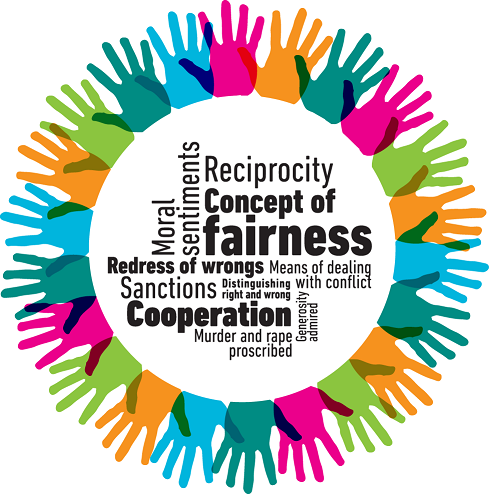
Protože morálka vznikala během evoluce, existuje ve všech společnostech a kulturách.
 Antropolog Donald E. Brown nečekal, že objeví morální jednotu lidstva. Ale objevil.
Antropolog Donald E. Brown nečekal, že objeví morální jednotu lidstva. Ale objevil.
Vědec hledal behaviorální nebo kognitivní vlastnosti, které jsou společné všem neurologicky normálními lidem, bez ohledu na to, ke které kultuře patřili. Chtěl vytvořit seznam "lidských univerzálií" pro všechny společnosti.
Jeho projekt odhalil řadu stálých etických vzorů přítomných v každé kultuře.
Náboženství a systémy víry na všech kontinentech byly velmi pestré a rozmanité. Nicméně, každé zakazovalo určité chování. Znásilnění? - Zakázáno. Vražda? - Zakázáno všude.[1]
Byly identifikovány další společné rysy. Například empatie. Spolupráce. Hanba. Koncept spravedlnosti. A tak dále. Od vyspělých západních demokracií až po izolované domorodé společnosti - "morální univerzálie".[2]
Desetiletí výzkumu mnoha kultur prokázala, že žádná společnost nemá monopol na dobré chování. Morální lidské chování nezávisí na tom, jaké preferujete náboženství či božstvo [3-7]; to ukazuje na jeho evoluční kořeny.
Dnes se velká část globálního výzkumu věnuje výzkumu morálky v různých kulturách; část z této části vychází z morálních univerzálií, které objevil Brown.[8-11] Sociolog Ara Norenzayan to shrnuje: "… spojení náboženství s morálkou je kulturně proměnlivé; vazba je slabá nebo neexistuje v malých skupinách, a v průběhu času a napříč společnostmi sílí s velikostí skupiny a nárůstem společenské složitosti."[12]
| Tvrzení 2 | Tvrzení 4 |
Odkazy
- Boyd R., Gintis H., Bowles S., & Richerson P.J. (2003). The evolution of altruistic punishment. Proceedings of the National Academy of Sciences USA, 100, 3531-3535.

- Brown, D.E. (1991). Human universals. New York : McGraw-Hill.
- Cushman, F., Young, L., & Hauser, M.D. (2007). The role of conscious reasoning and intuition in moral judgments: Testing three principles of harm. Psychological Science, 17 (12), 1082-89.

- Dahlsgaard, K., Peterson, C., & Seligman, M. E. P. (2005). Shared virtue: The convergence of valued human strengths across culture and history. Review of General Psychology, 9(3), 203-213.

- Fehr E., Fischbacher, U. & Gachter, S. (2002). Strong reciprocity, human cooperation, and the enforcement of social norms. Human Nature, 13:1-25.

- Fiddick, L. (2004). Domains of deontic reasoning: Resolving the discrepancy between the cognitive and moral reasoning literatures. Quarterly Journal of Experimental Psychology, 57A, 447-474.

- Fiddick, L. (2003). Is there a faculty of deontic reasoning? A critical reevaluation of abstract deontic versions of the Wason selection task. In D. Over (Ed.), Evolution and the psychology of thinking: The debate. (pp. 33-60). Psychology Press.

- Henrich, J., Boyd, R., Bowles, S., Camerer, C., Fehr, E., Gintis, H., . . . Tracer, D. (2005). 'Economic Man' in cross-cultural perspective: Behavioral experiments in 15 small-scale societies. Behavioral and Brain Sciences, 28(6), 795–855.

- Gintis, H., Bowles, S., Boyd, R. & Fehr, E. (2003). Explaining altruistic behavior in humans. Evolution and Human Behavior, 24, 153-172.

- Johnson, D.D.P. (2005) God's punishment and public goods: A test of the supernatural punishment hypothesis in 186 world cultures. Human Nature, 16 (4), 410–446.

- Lieberman, D. (2007). Moral sentiments relating to incest: Discerning adaptations from by–products. In W. Sinnott–Armstrong (Ed.), Moral Psychology Volume 1: The Evolution of Morality. Cambridge, MA : MIT Press.
- Lieberman, D. & Symons, D. (1998). Sibling incest avoidance: From Westermarck to Wolf. Quarterly Review of Biology, 73 (4), 463–466.
- Lieberman, D., Tooby, J. & Cosmides, L. (2003). Does morality have a biological basis? An empirical test of the factors governing moral sentiments regarding incest. Proceedings of the Royal Society, London B, 270, 819–826.

- Newman, G. (1976). Comparative Deviance: Perception and law in six cultures.
- Norenzayan, A., & Gervais, W. M. (2013). Secular rule of law erodes believers’ political intolerance of atheists. Religion, Brain, and Behavior.

- O’Neill, P., & Petrinovich, L. (1998). A Preliminary Cross-Cultural Study of Moral Intuitions. Evolution and Human Behavior, 19(6), 349-367.
- Roes, F. L., & Raymond, M. (2003). Belief in moralizing gods. Evolution and Human Behavior, 24, 126–35.

- Schwartz, S. H. (1994). Are there universal aspects in the structure and contents of human values? Journal of Social Issues, 50(4), 19-45.

- Sugiyama, L.S., Tooby, J. & Cosmides, L. (2002). Cross-cultural evidence of cognitive adaptations for social exchange among the Shiwiar of Ecuadorian Amazonia. Proceedings of the National Academy of Sciences, 99(17) , 11537-11542.

- Thornhill, N. W. (1991). An evolutionary analysis of rules regulating human inbreeding and marriage. Behavioral and Brain Sciences, 14(02), 247-261.
- Wade, M.J., & Breden, F. (1980). The evolution of cheating and selfish behavior. Behavioral Ecology and Sociobiology, 7 (3), 167-172.
- Wattles, J. (1996). The golden rule. Oxford : Oxford University Press.
- Weeden, J., & Kurzban, R. (2013). What predicts religiosity? A multinational analysis of reproductive and cooperative morals. Evolution and Human Behavior, 34(6) 440-445.
- Wenegrat, B., Castillo-Yee, E. & Abrams, L. (1996). Social norm compliance as a signaling system: Studies of fitness-related attributions consequent on a group norm violation. Ethology and Sociobiology, 17 (6), 417-424.
- Wiessner, P. (2005). Norm enforcement among the Ju/'hoansi Bushmen: A case of strong reciprocity? Human Nature, 16, 115-145.

- Westermarck, E. A. (1906). The Origin and Development of the Moral Ideas. London: Macmillan


